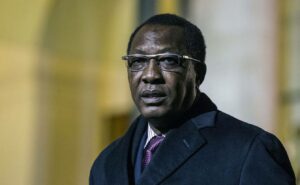Chad’s president Deby seeking sixth term amid boycotts of poll

As polls closed in Chad on Sunday, the ruling party and opposition parties were divided on the question of voter turnout and what it means for the outcome of the election.
Opposition parties claimed their calls to boycott the vote had proven successful.
“Nowhere in the whole country were there any queue of voters waiting, as is usually seen. The members of the polling station and the candidates’ delegates, when there are, were much more numerous than the voters,” Sakeh Kebzabo, who came second in the 2016 vote but withdrew this year.
Kebzabo also criticised flaws in the process for soldiers’ voting on Saturday.
“They voted without a voter card, without a voting booth, without a list of candidates and under the orders of an officer who indicated where and who to tick on the ballot. This is democracy according to [incumbent President Idriss] Deby, democracy which has been misled and that we have always condemned,” he said.
The ruling party, in turn, hailed the voter turnout.
“Democracy has triumphed. The Chadians taught a great democratic lesson. The voters braved the distance, the heat and the discourse of fear. A very strong political signal was sent by the Chadians,” said Mahamat Zen Bada, campaign manager for Deby.
Deby is expected to secure a sixth term in office. Running against him this year are six other candidates, but only one – former prime minister Pahimi Padacke Albert – is seen as a realistic rival.
The opposition has little chance of unseating Deby, who has kept a firm grip on power for some 30 years.
The run-up to the poll has seen a crackdown on protests by unions, opposition supporters and rights activists, who held weekly demonstrations against a fresh term for Deby.
The violence led some opposition figures to boycott the polls. Some have been arrested. In the southern neighbourhoods of the capital N’Djamena, few voters turned up to the polls.
In Goin, a stronghold for opposition candidate Albert, local media said voter turnout was also low, except for in Albert’s immediate neighbourhood.
Similarly, in Moundou, southern Chad, where the country’s only female candidate, Lucie Beassemda, hails from, a teacher at a school used as a polling station said voters were “dragging their feet.”
Conversely, neighbourhoods and districts where Deby is popular saw large numbers of voters, according to local media reports. As Deby cast his ballot, he denied that any boycotts have taken place, adding that he is pleased that the presidential election “is taking place within the constitutional deadline.”
Deby, 68, came to power in a 1990 coup against dictator Hissene Habre.
Because of his help in the fight against Islamists in the Sahel, especially in Mali and Niger, the former army chief is held in high esteem in France and by heads of state in the Sahel.
But Deby has largely lost support among the population. Mismanagement, corruption, nepotism and falling oil prices have massively exacerbated poverty.
According to the World Food Programme, Chad is the third poorest country in the world.
Source: GNA
